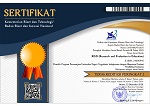Academic performance and moral competence: A match made in heaven?
DOI:
https://doi.org/10.21831/reid.v2i2.8956Keywords:
moral competence, academic performance, higher education, Islamic perspectiveAbstract
References
Accounting and Auditing Organization for Islamic Financial Institutions. (2015). Accounting, auditing, and governance standards for Islamic financial institutions. Retrieved from http://aaoifi.com/ standard/accounting-standards/?lang= en
Al-Bayhaqi, A. B. (1994). Al-sunan al-kubra. Beirut: Dar al-kutub al-ilmiyyah.
Al-Hajjaj, M. B. (2007). Sahih Muslim. Riyadh: Dar-us-salam Publications.
Al-Nawawi, I. (1999). Riyad-us-saliheen. Riyadh: Dar-us-salam Publications.
Ann, H. W. (2015). ICGPA - Too little, too late? Retrieved from http://www.bfm.my/ current-affairs-icgpa.html
Benninga, J. S., Berkowitz, M. W., Kuehn, P., & Smith, K. (2003). The relationship of character education implementation and academic achievement in elementary schools. Journal of Research in Character Education, 1(1), 19-32.
Berg, M. (2015). Lending blind: Shadow banking and federal reserve governance in the global financial crisis. Annandale-On-Hudson, NY: Levy Economics Institute.
Department of Statistics, Malaysia (2010). Population distribution and basis demographic characteristics. Retrieved from https:// web.archive.org/web/20150301154300/http://www.statistics.gov.my/portal/download_Population/files/census2010/Taburan_Penduduk_dan_Ciri-ciri_Asa s_Demografi.pdf
Elias, M. J., White, G., & Stepney, C. (2014). Surmounting the challenges of im-proving academic performance: Closing the achievement gap through social-emotional and character develop-ment. Journal of Urban Learning, Teaching, and Research, 10, 14-24.
Flay, B. R., Acock, A., Vuchininch, S., Lewis, K., Bavarian, N., Schure, M., ... & Ji, P. (2012). Social-emotional and character development to improve student be-haviour and academic achievement: Results from two school-based random-ized trials. In 2ND International Conference on the Future of Education, Florence, Italy.
Griffin, K. P. (2011). The effect of character education on the academic achievement of high school students. The Divergent Learning Journal, 25.
Halgren, K. A. (2012). Computing inter-rater reliability for observational data: An overview and tutorial. Tutor Quants Methods Psychol., 8(1), 23-34.
Hemraj, M. (2015). US Statutory Regulation. In M. Hemraj (Ed.), Credit rating agencies: Self-regulation, statutory regulation and case law regulation in the United States and European Union (pp. 93-149). Switzer-land: Springer International.
Hightower, M. A. B. (2001). The relationship between middle school students' level of character development and their behaviour, academic achievement, and attendance. Legacy ETDs. Paper 775. Retrieved from http://digitalcommons. georgiasouthern.edu/etd_legacy/775
Hood, K. L. (2011). Character education and parental involvement: Impact on academic achievement (Master's thesis). Rowan University, Glassboro, NJ.
International Islamic University Malaysia. (2014). Mission and vision. Retrieved from http://www.iium.edu.my/medicine/about-us/mission-vision
Kariuki, P. & Williams, L. (2006). The relationship between character traits and academic performance of AFJROTC high school students. Retrieved from http://files.eric.ed.gov/ fulltext/ED494959.pdf
Kern, M. L., & Bowling, D. S. (2015). Character strengths and academic performance in law students. Journal of Research in Personality, 55, 25-29.
Khor, A. (2015). Towards an integrated grading system. Retrieved from http://www.thestar.com.my/News/Education/2015/08/16/Towards-an-inte grated-grading-system/
Lombardo, T. (2008). Ethical character development and personal and academic excellence. The wisdom page. Retrieved from www.wisdompage.com /Lombardo"”EthicalCharacterDevelop ment2011.pdf
Luttamaguzi, J. B. (2012). Influence of moral aptitude on academic performance of the undergraduate students in school of education Makerere University. Kampala: Makarere University Institutional Repository. Retrieved from http://dspace.mak.ac. ug/handle/10570/3810
Malaysia Education Blueprint 2013-2025 (2012). Develop values-driven Malaysians. Retrieved from http://www.moe.gov. my/userfiles/file/PPP/Preliminary-Blu eprint-Eng.pdf
Malaysian Institute of Accountants (2012). NIP Philosophy. Retrieved from http: //www.iim.org.my/en/falsafah-pin
Markham, J. W. (2015). A financial history of modern US corporate scandals: From enron to reform. New York, NY: Routledge.
Mollman, S. (2004). The effects of character education on positive self-esteem and academic achievement (Doctoral dissertation). University of Wisconsin-Stout, Menomonie, WI.
Olowookere, E. I., Alao, A. A., Odukoya, J. A., Adekeye, O. A., & Ade'Agbude, G. (2015). Time management practices, character development and academic performance among University undergraduates: Covenant University experience. Creative Education, 6(01), 79.
Pallant, J. (2001). SPSS survival manual. Berkshire: McGraw-Hill Education.
Phelan, C., & Wren, J. (2006). Exploring reliability in academic assessment. Retrieved from https://www.uni.edu/ chfasoa/reliabilityandvalidity.htm.
Savulescu, J., Crisp, R., Fulford, K. W., & Hope, T. (1999). Evaluating ethics competence in medical education. Journal of Medical Ethics, 25(5), 367-374.
Schaps, E., Solomon, D., & Watson, M. (1985). A program that combines character development and academic achievement. Educational Leadership, 43(4), 32-35.
Snyder, F., Flay, B., Vuchinich, S., Acock, A., Washburn, I., Beets, M., & Li, K. K. (2009). Impact of a social-emotional and character development program on school-level indicators of academic achievement, absenteeism, and discipli-nary outcomes: A matched-pair, cluster-randomized, controlled trial. Journal of Research on Educational Effectiveness, 3(1), 26-55.
Tay, E. (2015). Malaysia to roll out ICGPA programme. Retrieved from http:// highered.easyuni.com/2015/08/malaysia-to-roll-ut-icgpa-programme/
Wynne, E. A., & Walberg, H. J. (1985). The complementary goals of character development and academic excellence. Educational Leadership, 43(4), 15-18.
Downloads
Published
How to Cite
Issue
Section
Citation Check
License
The authors submitting a manuscript to this journal agree that, if accepted for publication, copyright publishing of the submission shall be assigned to REID (Research and Evaluation in Education). However, even though the journal asks for a copyright transfer, the authors retain (or are granted back) significant scholarly rights.
The copyright transfer agreement form can be downloaded here: [REID Copyright Transfer Agreement Form]
The copyright form should be signed originally and sent to the Editorial Office through email to reid.ppsuny@uny.ac.id

REID (Research and Evaluation in Education) by http://journal.uny.ac.id/index.php/reid is licensed under a Creative Commons Attribution-ShareAlike 4.0 International License.







.png)





